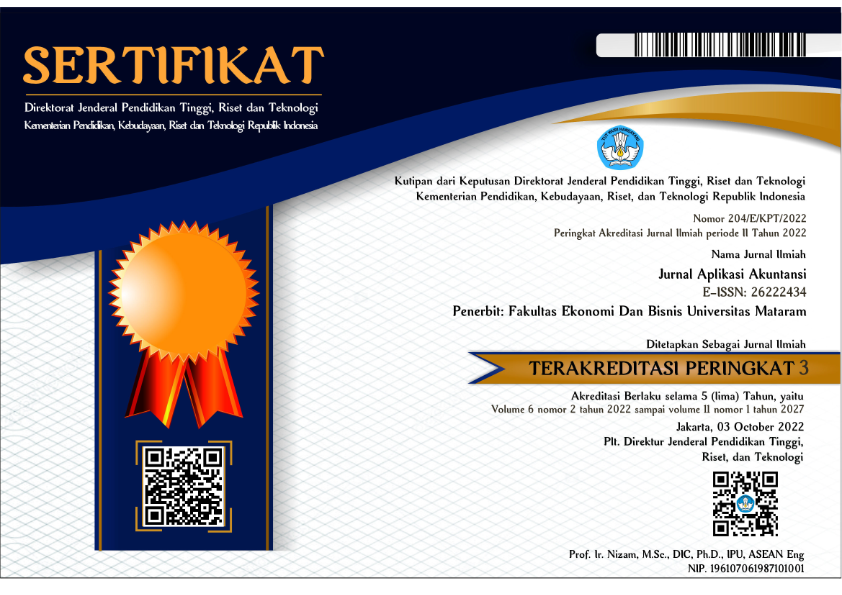POWER AND TRUST: A MEDIATOR IN THE RELATIONSHIP BETWEEN PROCEDURAL JUSTICE AND TAX COMPLIANCE IN INDONESIA
DOI:
https://doi.org/10.29303/jaa.v8i2.327Keywords:
coercive power, legitimate power, procedural justice, tax compliance, trustAbstract
This study analyses the connection between procedural justice, trust and power concerning tax compliance in Indonesia and investigates the mediating influence of trust and power tax authorities hold in this relationship. While various factors play a role in tax compliance behaviour in Indonesia, the country still struggles to achieve maximum compliance, falling short of international standards in terms of tax ratio. Only half of Indonesians have confidence in the tax system, and procedural justice is closely linked to power and trust. This study is groundbreaking as it is the first to investigate these three factors simultaneously in Indonesia. A quantitative approach was employed, with data gathered from 371 taxpayers and analyzed using the PLS-SEM method. The findings indicate that legitimate power and trust are positively associated with voluntary tax compliance and function as mediators between procedural justice and tax compliance. However, no correlation was found between procedural justice and tax compliance or between coercive power and tax compliance. To enhance taxpayer compliance in Indonesia, it is recommended to bolster trust in the tax authority and its jurisdictions. This study addresses a gap in the tax compliance literature. It enhances the theoretical framework, providing valuable practical insights for compliance improvement strategies, particularly for the Indonesian Directorate General of Taxes. The findings support developing more effective policies, improving tax education, and promoting transparency to strengthen public trust and compliance.
References
Akhlas, Ardian Wail; Gorbiano, M. I. (2019). Indonesians skeptical about tax transparency: Survey. Thejakartapost.Com.
Ali, A., & Ahmad, N. (2014). Trust and tax compliance among Malaysian working youth. International Journal of Public Administration, 37(7), 389–396.
Braithwaite, V. (2003). Dancing with tax authorities: Motivational postures and non-compliant actions. Taxing Democracy, 3, 15–39.
De Cremer, D., & Tyler, T. R. (2007). The effects of trust in authority and procedural fairness on cooperation. Journal of Applied Psychology, 92(3), 639.
Faizal, S. M., Palil, M. R., Maelah, R., & Ramli, R. (2019). The Mediating Effect of Power and Trust in the Relationship between Procedural Justice and Tax Compliance. Asian Journal of Accounting & Governance, 11.
Font, J., & Blanco, I. (2007). Procedural legitimacy and political trust: The case of citizen juries in Spain. European Journal of Political Research, 46(4), 557–589.
Gangl, K., Hofmann, E. B., Hartl, B., & Kirchler, E. (2015). The double-edged relationship between coercive power and compliance with public authority: Evidence from a representative sample of Austrian self-employed taxpayers. Available at SSRN 2667630.
Gangl, K., Hofmann, E. B., Pollai, M., & Kirchler, E. (2012). The dynamics of power and trust in the’slippery slope framework’and its impact on the tax climate. Available at SSRN 2024946.
Gobena, L. B., & Van Dijke, M. (2016). Power, justice, and trust: A moderated mediation analysis of tax compliance among Ethiopian business owners. Journal of Economic Psychology, 52, 24–37.
Hair Jr, J. F., Hult, G. T. M., Ringle, C. M., Sarstedt, M., Danks, N. P., Ray, S., Hair, J. F., Hult, G. T. M., Ringle, C. M., & Sarstedt, M. (2021). An introduction to structural equation modeling. Partial Least Squares Structural Equation Modeling (PLS-SEM) Using R: A Workbook, 1–29.
Hofmann, E., Gangl, K., Kirchler, E., & Stark, J. (2014). Enhancing T ax Compliance through Coercive and Legitimate Power of T ax Authorities by Concurrently Diminishing or Facilitating Trust in T ax Authorities. Law & Policy, 36(3), 290–313.
Hough, M., Jackson, J., Bradford, B., Myhill, A., & Quinton, P. (2010). Procedural justice, trust, and institutional legitimacy. Policing: A Journal of Policy and Practice, 4(3), 203–210.
Kastlunger, B., Lozza, E., Kirchler, E., & Schabmann, A. (2013). Powerful authorities and trusting citizens: The Slippery Slope Framework and tax compliance in Italy. Journal of Economic Psychology, 34, 36–45.
Kemenkeu.go.id. (2019). Mengenal rasio pajak indonesia. Kemenkeu.Go.Id.
Kirchler, E., Hoelzl, E., & Wahl, I. (2008). Enforced versus voluntary tax compliance: The “slippery slope” framework. Journal of Economic Psychology, 29(2), 210–225.
Kirchler, E., & Wahl, I. (2010). Tax compliance inventory TAX-I: Designing an inventory for surveys of tax compliance. Journal of Economic Psychology, 31(3), 331–346.
Kogler, C., Muehlbacher, S., & Kirchler, E. (2015). Testing the “slippery slope framework” among self-employed taxpayers. Economics of Governance, 16, 125–142.
Lind, E. A. (2001). Fairness heuristic theory: Justice judgments as pivotal cognitions in organizational relations. Advances in Organizational Justice, 56(8).
Muehlbacher, S., Kirchler, E., & Schwarzenberger, H. (2011). Voluntary versus enforced tax compliance: Empirical evidence for the “slippery slope” framework. European Journal of Law and Economics, 32, 89–97.
Murphy, K. (2004). The role of trust in nurturing compliance: A study of accused tax avoiders. Law and Human Behavior, 28, 187–209.
Murphy, K. (2005). Regulating more effectively: The relationship between procedural justice, legitimacy, and tax non‐compliance. Journal of Law and Society, 32(4), 562–589.
Murphy, K. (2008). Enforcing tax compliance: to punish or persuade? Economic Analysis and Policy, 38(1), 113–135.
Murphy, K. (2009). Procedural justice and affect intensity: Understanding reactions to regulatory authorities. Social Justice Research, 22, 1–30.
Naeem, A., & Gulzar, S. (2021). Voluntary tax compliance behavior of individual taxpayers in Pakistan. Financial Innovation, 7(1), 1–23.
OECD. (2020). Revenue Statistics in Asia and the Pacific 2020 ─ Indonesia.
Porcano, T. M. (1988). Correlates of tax evasion. Journal of Economic Psychology, 9(1), 47–67.
Rachmawan, R., Subekti, I., & Abid, N. (2020). The effect of tax knowledge on relationship of procedural justice perception towards voluntary tax compliance mediated by trust. International Journal of Research in Business and Social Science (2147-4478), 9(4), 207–213.
Searle, R., Den Hartog, D. N., Weibel, A., Gillespie, N., Six, F., Hatzakis, T., & Skinner, D. (2011). Trust in the employer: The role of high-involvement work practices and procedural justice in European organizations. The International Journal of Human Resource Management, 22(05), 1069–1092.
Tyler, T. R. (2004). Enhancing police legitimacy. The Annals of the American Academy of Political and Social Science, 593(1), 84–99.
Tyler, T. R. (2006). Why people obey the law. Princeton university press.
Van Dijke, M., & Verboon, P. (2010). Trust in authorities as a boundary condition to procedural fairness effects on tax compliance. Journal of Economic Psychology, 31(1), 80–91.
Wahl, I., Kastlunger, B., & Kirchler, E. (2010). Trust in authorities and power to enforce tax compliance: An empirical analysis of the “slippery slope framework.” Law & Policy, 32(4), 383–406.
Wenzel, M. (2002). The impact of outcome orientation and justice concerns on tax compliance: the role of taxpayers’ identity. Journal of Applied Psychology, 87(4), 629.
Worsham Jr, R. G. (1996). The Effect of Tax Authority Behavior on Taxpayer Compliance: A Procedural Justice Approach. Journal of the American Taxation Association, 18(2).
Downloads
Published
How to Cite
Issue
Section
License
Copyright (c) 2023 Lilian Yuniar Stilia, Riko Riandoko, Nafis Dwi Kartiko

This work is licensed under a Creative Commons Attribution-NonCommercial-ShareAlike 4.0 International License.









